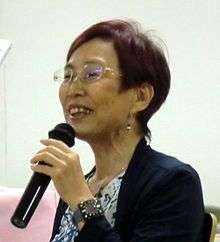Chizuko Ueno
| Chizuko Ueno | |
|---|---|
 Chizuko Ueno giving a talk at the University of Tokyo (2014) | |
| Born |
July 12, 1948 Kanazawa, Ishikawa Prefecture, Japan[1] |
| Nationality | Japanese |
| Alma mater | University of Kyoto |
| Occupation | Professor of sociology |
| Known for | Japanese feminist |
Chizuko Ueno (上野 千鶴子 Ueno Chizuko, born July 12, 1948, in Kanazawa, Ishikawa Prefecture)[1] is a Japanese sociologist and Japan's "best-known feminist".[2]
Early life and education
Ueno was raised as a Christian, which she said was "very unusual" because only 1% of the Japanese population is Christian.[3] In an interview with The Japan Times, she describes her father as "a complete sexist" who had extremely high expectations of her two brothers but only considered his daughter as a "pet girl", which allowed her the "freedom to do whatever I wanted to do", and so she decided to study sociology at the University of Kyoto, where she participated in the Zengakuren student protests of the 1960s.[3]
Career
From 1979 to 1989, she was a Lecturer and later Associate Professor at the Heian Women's College. She was an Associate Professor and Professor at the Kyoto Seika University at the Department of Humanities from 1989 to 1994. From 1982 to 1984 she was a visiting scholar in the United States, and from 1996 to 1997 she was a guest faculty member at Columbia University's Barnard College.[1] Out of the blue, in 1993, after being rejected from many other universities as a strident feminist scholar, she received an invitation from the University of Tokyo.[3]
She is a special guest professor at the Graduate School of Core Ethics and Frontier Sciences at Ritsumeikan University and a professor emeritus at the University of Tokyo.[4] She is the Chief Director of the Women’s Action Network (WAN) in Japan.[5]
Scholarship
Her research field includes feminist theory, family sociology, and women's history. She is best known for her contribution to gender studies in Japan. As a public intellectual, she played a central role in creating the field of gender studies in Japanese academia. At the same time, her radical tendency and strong character has invited criticism (she described herself as "critical, assertive, and disobedient").[3]
Ueno is a trenchant critic of postwar revisionism and criticizes the whitewashing of Japanese history, which she claims attempts to justify its colonialism, wartime atrocities, and racism both before and after World War II. In particular, she has defended the compensation of Korean comfort women who were forced into prostitution by the Empire of Japan.[1][3]
Ueno has influenced Japanese postmodernists, including Karatani Kojin, Akira Asada, and Noriko Mizutani.[1] In the mid-1980s, Ueno was also involved in a public debate with Japanese eco-feminist Aoki Yayoi.[6]
Selected publications
- The Modern Family in Japan: Its Rise and Fall. Victoria, Australia: Trans Pacific Press. 2009. ISBN 978-1876843625. (first published in Japanese in 1994)
- "The Politics of Memory: Nation, Individual and Self". History & Memory. 11 (2): 129–152. 1999. doi:10.1353/ham.2005.0001. (translated from Japanese by Jordan Sand)
- Nationalism and Gender. Victoria, Australia: Trans Pacific Press. 2004. ISBN 978-1876843595.
- Sits on the editorial board of the Journal of Women, Politics & Policy.[7]
References
- 1 2 3 4 5 Ohmoto, Ayumi. "Chizuko Ueno". Pennsylvania State University. Retrieved 29 March 2014.
- ↑ "Holding back half the nation". The Economist. 29 March 2014.
- 1 2 3 4 5 Prideaux, Eric (5 March 2006). "Speaking up for her sex". The Japan Times.
- ↑ "Ueno, Chizuko". Ritsumeikan University. Retrieved 29 March 2014.
- ↑ "Current Concept of Worldwide Women's Action Network (W-WAN)". Worldwide Women’s Action Network (W-WAN). 30 December 2013.
- ↑ Buckley, Sandra (1997-02-27). Broken Silence: Voices of Japanese Feminism. University of California Press. ISBN 9780520914681.
- ↑ "Journal of Women, Politics & Policy - Editorial board". Taylor and Francis. Retrieved 3 June 2014.